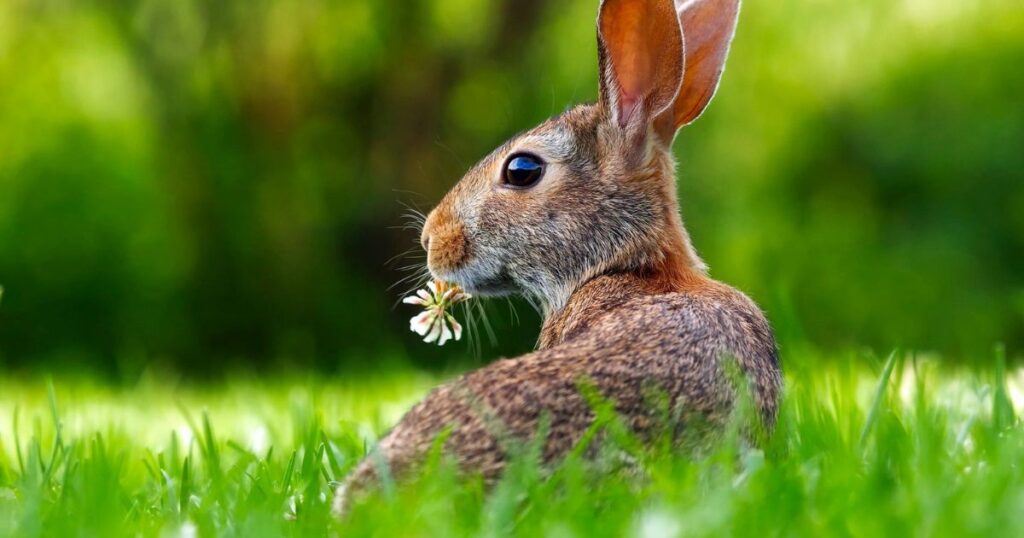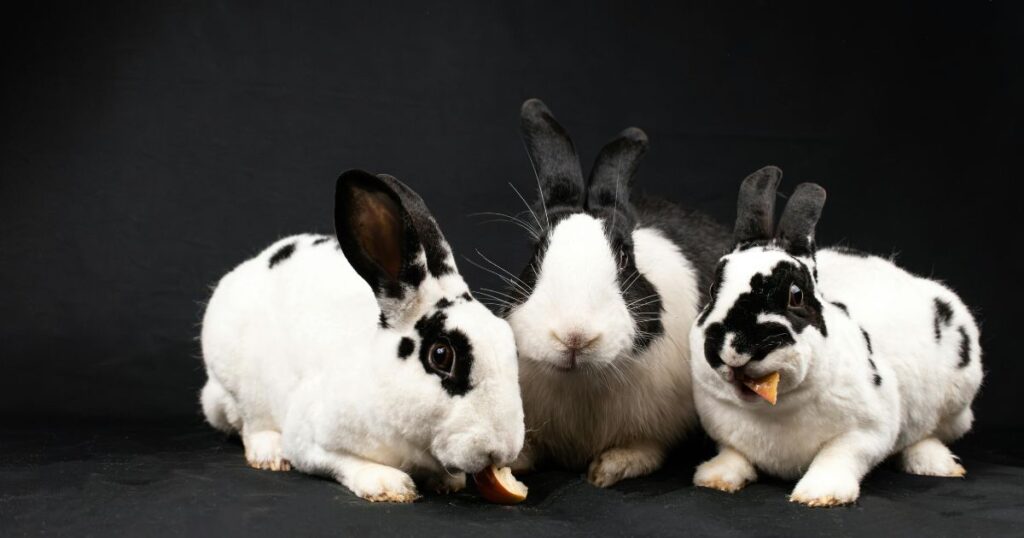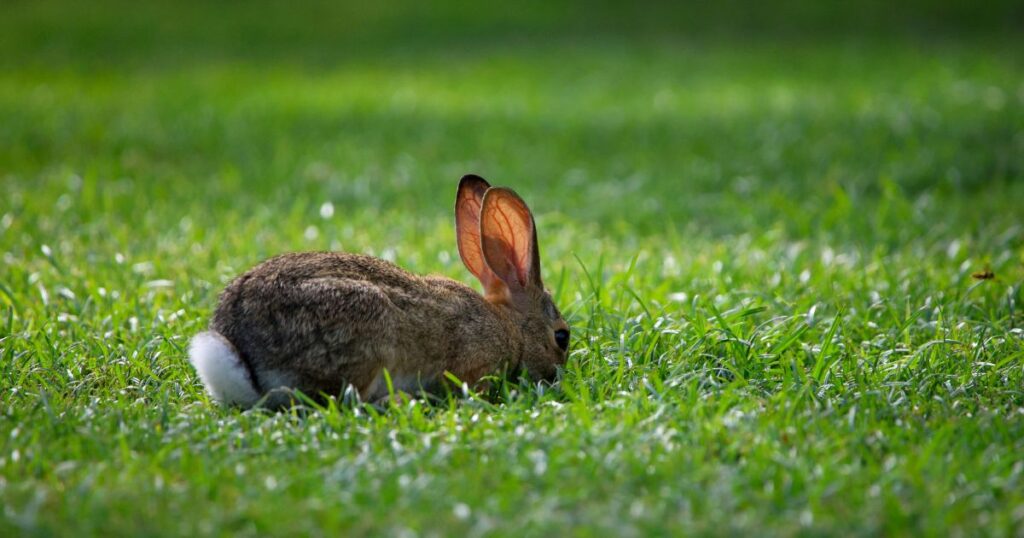As an Amazon Associate, I earn from qualifying purchases
Food Digest in a Rabbit: Rabbits, like cats and dogs, have a monogastric (simple) digestive system which is less efficient because they do not pass through two stomachs. They are more efficient in digesting fibrous plant materials than other animals (such as hay and grass).
It is very important to how food gets digested in a rabbit because it will provide you with knowledge of what the essential nutrients are and what has to be fed so they do not get unhealthy.
In this post, we will explore the different stages of digestion in a rabbit and why their diet plays such an essential role in their overall health.

What do I need for my rabbit?
Rabbits are wonderful pets known for their playful and curious nature, but they also have specific needs that must be met to keep them healthy and happy. Before bringing a rabbit into your home, it’s most important to understand the essentials they require, from the right kind of food and housing to proper grooming and health care.
Providing a safe and stimulating environment will ensure your rabbit lives a long and comfortable life. In this guide, we’ll explore everything you need to take care of your rabbit.
Where does a rabbit digest most of its food?
Nearly all of a rabbit’s food is digested in the cecum, a large pouch at the junction of the small and large intestines. The cecum serves as a fermentation vat where bacteria digest the cellulose and other complex carbohydrates present in the fibrous plant material which makes up most of what rabbits eat.
This process of fermentation allows rabbits to absorb nutrients that are otherwise unutilizable in the wild, including vitamins and volatile fatty acids, which become essential for their energy requirements.
Because of this unique digestive adaptation, a rabbit’s diet is largely made up of tough-to-digest plant material.
Is it true that rabbits eat their own feces so they can digest it again?
This includes coprophagy (ingestion of fecal material) but, rabbits consume partial mucus and soft cecotropes which are different feces from the standard hard pellets defecated.
Cecotropes are produced in the cecum, a part of the digestive tract that ferments food through bacterial activities where certain vitamins and proteins are synthesized. Let me explain it…… When an animal eats food, only part of its nutrients will be absorbed in the gastrointestinal sac during digestion.
This is exactly how animals are digesting! To get the most from their 24/7 diet of hard-to-digest, fiber-rich grasses and other vegetation that doesn’t quite meet high-metabolism needs in an animal whose digestive system leads it single file through a briefly available crop of food.
This behaviour forms an essential part of their natural feeding process which helps to keep them in the best health.
Does rabbit eat blended veggies like cat’s wet food?

Some will puree or blend vegetables, but a rabbit diet is not the same as a cat…! Rabbits’ teeth are ever-growing and require the rabbit to chew on fibrous materials in their natural diet to properly wear down his or her dental health.
Rabbits and guinea pigs have open-rooted teeth that grow continuously throughout their life so chewing on fibrous vegetation such as hay helps to wear down their teeth evenly, vital for preventing overgrowth.
Rabbits require whole fresh vegetables to ensure proper nutrition and the fiber needed for good digestion. Yet, if a rabbit is poorly or aging and/or has dental issues that difficult for them to chew food then your vet might suggest giving the foods as pureed.
A pet rabbit should mainly eat high-quality hay, along with fresh water fewer portions of fresh vegetables, and a lesser quantity of pellets.
What digestive system does a rabbit have?
The digestive system of the rabbit is very specialized; it is set up to handle high-fiber diets with a great deal of efficiency. Since they are herbivores, rabbits eat grass and hay (plus leafy greens) — all of which means there is a more complex lab in their digestive favor to extract every last crucial nutrient.
Knowing how a rabbit’s system works is crucial in feeding them correctly to give them the best possible diet and longest life. Chewing to hindgut fermentation is a very important part of their digestion process.
Which, if not functioning properly leads them to other health-related problems. Rabbits are hindgut fermenters and require several different components in the diet for proper health.
What is the best rabbit food?
Rabbits are herbivores, reliant on a high-fiber diet to fuel their delicate digestive system and reduce the incidence of health issues. Learn what kinds of foods are best for your rabbit out there!
A well-rounded diet — from hay and fresh veggies to branded pellets made for rabbits alone, is all critical in maintaining your bunn at its best.
How long does it take for a rabbit to digest?
Rabbits have a unique and complex digestive system that allows them to efficiently process the high-fiber diet they consume.
However, digestion in rabbits works differently than in many other animals, requiring a longer and more specialized process to extract the necessary nutrients from fibrous materials like hay and leafy greens.
Understanding how long it takes for a rabbit to digest food is essential for ensuring their diet supports healthy digestion and prevents common issues like gastrointestinal stasis.
How do you feed a pet rabbit as closely to what they would eat in nature as possible?
Rabbits in the wild mainly feed on fibrous plants, grasses, and leafy greens, which are best suited to their sensitive digestive systems.
A pet rabbit should be fed a similar diet to its wild counterparts — this is necessary not only for keeping them healthy but also so that their body processes work as nature intended, thus reducing the incidence of common health problems.
Do pet rabbits have sensitive digestive systems?
Pet rabbits are known for having particularly sensitive digestive systems, which require careful attention to their diet and overall care. Unlike many other animals, rabbits rely heavily on a fiber-rich diet to keep their digestive system functioning properly.
Even small changes in their food or environment can lead to serious health issues, such as gastrointestinal stasis or bloating.
Understanding the sensitivity of a rabbit’s digestive system is crucial for preventing problems and ensuring their well-being.
What kind of food should I feed my pet rabbit?
Rabbits require a fiber-rich diet to support their sensitive digestive systems and maintain their well-being. Here’s a guide to the best foods you should provide for your pet rabbit:
Hay (Primary Food): Hay should make up the majority of your rabbit’s diet, as it is essential for digestion and dental health. Fresh timothy hay, meadow hay, or orchard grass are excellent choices. Alfalfa hay is suitable for younger rabbits but should be limited for adults due to its high calcium content.
Fresh Vegetables: Leafy greens such as romaine lettuce, cilantro, parsley, and spinach are great for rabbits. Other vegetables like carrots, bell peppers, and broccoli can be fed in moderation. Avoid iceberg lettuce as it offers little nutritional value.
High-Quality Pellets: Small amounts of rabbit pellets can be provided to supplement their diet. Look for pellets that are high in fiber and free from added sugars and fillers. Pellets should not be the main source of food but a supplementary part.
Fresh Water: Ensure your rabbit always has access to fresh, clean water. Use a water bowl or bottle, and change the water regularly.
Anatomy of the Rabbit’s Digestive System

The digestive system of a rabbit is uniquely adapted to process fibrous plant material. Here are the key components:
- Mouth and Teeth: Rabbits have strong incisors for cutting through tough plant stems and molars for grinding. Their teeth grow continuously, necessitating constant chewing to maintain proper length and sharpness.
- Esophagus: This is the tube that transports food from the mouth to the stomach. Rabbits have a strong gag reflex that prevents them from vomiting.
- Stomach: A rabbit’s stomach is relatively small but muscular, designed to break down food with a high concentration of hydrochloric acid.
- Small Intestine: Here, most of the nutrient absorption occurs. The small intestine in rabbits is efficient at absorbing sugars, vitamins, and minerals.
- Cecum: Arguably the most critical part of a rabbit’s digestive system, the cecum acts like a large fermentation vat where bacteria break down the fibrous plant material into digestible components. This process is vital as it helps in synthesizing vitamins and extracting nutrients.
- Large Intestine and Colon: The final stages of digestion occur here, where water is absorbed and fecal pellets are formed.
The Digestive Process
The digestion process in rabbits is intricate, involving both mechanical and chemical digestion:
Ingestion and Initial Breakdown: Rabbits select food based on smell and texture. They prefer fresh, high-fiber materials such as hay, which is crucial for their dental health and overall digestion. Chewing not only reduces the food into smaller pieces but also mixes it with saliva-containing enzymes that start the digestive process.
Stomach Digestion: Once the food reaches the stomach, it is mixed with gastric juices. The stomach’s acidic environment helps in killing bacteria that the rabbit may have ingested along with the food and begins the breakdown of proteins.
Small Intestine Absorption: As the partially digested food moves into the small intestine, enzymes from the pancreas and bile from the liver aid in the digestion of proteins, fats, and carbohydrates. Nutrients are absorbed through the walls of the small intestine into the bloodstream.
Cecum Fermentation: The indigestible fibers move into the cecum, where they undergo bacterial fermentation. This process breaks down the fibers into volatile fatty acids, which are critical energy sources for rabbits. The cecum also synthesizes vitamins B and K.
Formation of Cecotropes: After fermentation, a special type of soft, nutrient-rich feces called cecotropes is produced. Rabbits reingest these directly from the anus, a behavior known as cecotrophy, which allows them to extract additional nutrients from their food.
Elimination: Hard, dry pellets are excreted as waste after the reabsorption of nutrients from the cecotropes. These pellets are different from cecotropes and are not reingested.
Nutritional Needs and Feeding Practices
Understanding the nutritional needs and appropriate feeding practices is essential for the health of a rabbit:
- Fiber: High-fiber foods like timothy hay should make up the bulk of a rabbit’s diet. Fiber is essential for proper gut motility and prevention of gastrointestinal stasis.
- Protein and Fats: A moderate amount of protein is necessary, especially for growing rabbits, while fats should be kept to a minimum.
- Vitamins and Minerals: Rabbits synthesize some of their own vitamins through cecal fermentation, but a balanced diet should also include vegetables rich in vitamins A and D, as well as a controlled intake of calcium to prevent urinary stones.
- Water: Adequate water intake is crucial to help manage the digestive process and prevent dehydration.
Common Digestive Issues in Rabbits
Rabbits are susceptible to several digestive issues, often due to improper diet:
- Gastrointestinal Stasis: A condition where the digestive system slows down or stops, often due to a low-fiber diet, dehydration, or stress.
- Dental Problems: Overgrown teeth can lead to difficulty in eating and subsequent digestive problems.
- Diarrhea: Can occur from an imbalance in the diet, especially from overconsumption of carbohydrates or low fiber.
Conclusion
The digestive system of a rabbit is a finely tuned mechanism that requires a balanced diet rich in fiber and low in fats and simple carbohydrates. Proper understanding and management of a rabbit’s diet can prevent common health issues and ensure a long, healthy life for these delicate creatures.
Knowing how to care for a rabbit’s digestive health is essential for any pet owner or breeder, ensuring that these animals receive the nutrients they need to thrive.
As an Amazon Associate, I earn from qualifying purchases

